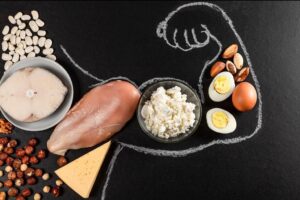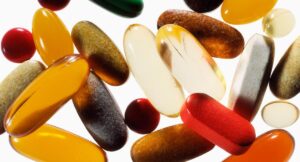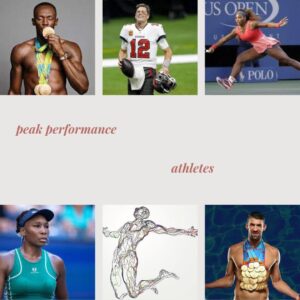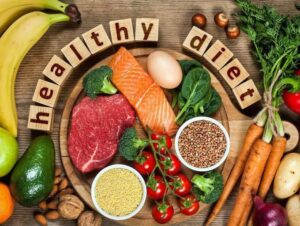THE CRITICAL ROLE OF NUTRITION IN OPTIMIZING PERFORMANCE

Are you looking to take your performance to the next level? Whether you’re an athlete, entrepreneur, or simply seeking to optimize your health, biohacking your nutrition could be the key to unlocking your full potential. Biohacking, the practice of using science and technology to optimize the body and mind, has gained popularity in recent years. By harnessing the power of nutrition, we can enhance our cognitive function, improve energy levels , and even boost our immune system. But with so much information out there, it can be overwhelming to know where to start. This is where a skilled biohacking nutritionist comes in. By analyzing your unique biochemistry, they can create a personalized nutri tion plan designed to help you achieve peak performance. So why settle for average when you can unlock your full potential through biohacking your nutrition?
Have you ever felt like your energy levels are low, your concentration is lacking, or your physi cal performance is not at its best? These issues can be caused by many factors, including poor nutrition. Biohacking is a way to optimize your body’s performance, and it starts with the foods you eat. A few years ago, I began experiencing persistent tiredn ess, joint pains, dry skin, and sores. After undergoing tests for my thyroid, I was diagnosed with hypothyroidism and prescribed Eltroxin. However, my symptoms persisted, and I was eventually referred to a consultant dermatologist who diagnosed me with Has himoto’s, an autoimmune condition, and prescribed medication to ease the itching. Three months ago, my doctor conducted a cholesterol test that revealed offthechart results for someone my age. Faced with the prospect of daily medication, I sought the adv ice of a nutritionist who recommended that I introduce more variety into my diet, reduce my animal fat intake, eat more vegetables and oily fish, cut out caffeine and processed foods, and drink more water. I followed this advice and saw astonishing improve ments, with my joint pains and dry skin disappearing and my cholesterol levels dropping dramatically. Implementing such small bio hacks has made a world of difference in my life, till then my systems were wallowing in lethargy but of late they are running at full throttle like a Ferrari engine. Over the years, I have learnt several other nutritional biohacks like Bulletproof coffee for focus, energy and weight loss and the use of aminos like beet and arginine for running, theanine and caffeine for focus an d mushrooms like cordyceps for running and lions mane for cognition.
One of the most effective hack for peak performance is to focus on nutrient dense foods. This means consuming foods that are rich in vitamins, minerals, and other essential nutrients that our bodies need to function at their best. By eating a diet that is full of whole foods, such as fruits, vegetables, whole grains, and lean proteins, we can provide our bodies with the fuel and nutrients they need to perform at their best.
Another impo rtant aspect of nutrition biohacking is to pay attention to our macronutrient ratios. This means balancing our intake of carbohydrates, proteins, and fats to optimize our energy levels and performance. Depending on our individual needs and goals, we may ne ed to adjust our macronutrient ratios to achieve optimal performance.

One Bollywood movie that comes to mind when discussing biohacking nutrition for phenomenal success is “Dangal” (2016), based on the true story of Indian wrestler Mahavir Singh Phogat , played by Aamir Khan. In the movie, Mahavir dreams of winning a gold medal for India in wrestling but is unable to do so himself due to family and financial constraints. Instead, he decides to train his daughters Geeta and Babita to become wrestling champions.
Mahavir takes a scientific and biohacking approach to their nutrition, training, and conditioning. He feeds them a highprotein, lowfat diet and monitors their progress using a scale to measure their weight and a stopwatch to time their runs. He a lso hires a professional wrestling coach and creates a rigorous training regimen for them, including running in the sand, lifting weights, and practicing wrestling techniques for hours every day.

Despite facing societal opposition and the girls’ initia l reluctance, Mahavir’s training pays off, and Geeta and Babita become successful wrestlers, winning numerous championships, and even representing India in the Commonwealth Games. Their success is a testament to the power of biohacking nutrition and traini ng to achieve phenomenal success in sports and beyond.
The movie “Dangal” showcases how a determined individual can use scientific and biohacking techniques to push the limits of the human body and achieve extraordinary success.
How Leading Athletes are Biohacking to Superhuman Performance
Athletes are always looking for ways to gain an edge over the competition, and many of them have turned to biohacking to do so. One popular approach is to use a highcarb diet, also known as the fat, lowketogenic diet. By restricting carbohydrates, the body enters a state of ketosis, where it burns fat for fuel instead of glucose. This can lead to improved endurance, faster recovery times, and better overall performance. Another biohacking strategy used b y athletes is to use supplements to enhance their performance. Some of the most popular supplements include creatine, caffeine, and beta alanine. These supplements can improve muscle strength and endurance, increase focus and alertness, and reduce fatigue.

Finally, many athletes use cryotherapy, which involves exposing the body to extremely cold temperatures, to improve their performance. Cryotherapy has been shown to reduce inflammation, speed up recovery times, and improve overall wellbeing. Several other famous athletes have used nutrition for biohacking to achieve peak performance throughout history. Here are some examples:
Phelps Michael Phelps is one of the most decorated Olympians in history, with 28 medals. Phelps is known to consume a highc alorie diet to fuel his training, including large quantities of carbohydrates and protein. He reportedly consumed up to 12,000 calories per day during his peak training periods.
Serena Williams Serena Williams is considered one of the greatest tennis pl time. Williams follows a primarily plantayers of all based diet, with a focus on whole, nutrientdense foods such as fruits, vegetables, and whole grains. She also avoids processed foods and sugary drinks.
Tom Brady Tom Brady is a professional football quarterback and has been known for his longevity in the sport. He follows a strict diet that focuses on whole foods, including lean protein, vegetables, and whole grains. Brady also avoids processed foods, sugar, and dairy.
Usain Bolt Usain Bolt is con sidered the fastest man in history and has won numerous Olympic gold medals. Bolt reportedly consumes a diet high in carbohydrates, including pasta, rice, and yams. He also consumes a moderate amount of protein and healthy fats.
Venus Williams Venus Wil liams is also a professional tennis player and follows a raw vegan diet, which involves consuming uncooked fruits, vegetables, nuts, and seeds. She credits her diet with helping her manage an autoimmune disease and improving her athletic performance.

These athletes demonstrate that nutrition can play a critical role in achieving peak performance. By consuming a diet that is high in nutrients and tailored to their individual needs, they are able to optimize their physical and mental performance. It is im portant to note that while these athletes follow specific diets, individual nutritional needs may vary and it is essential to consult with a qualified healthcare professional before making significant changes to one’s diet or supplement regimen.
COMPONENT S OF FOOD AND THEIR IMPORTANCE IN HUMAN PERFORMANCE
As the food we eat provides the energy and nutrients needed for physical and cognitive function, recovery, and growth. Let’s discuss the importance of macronutrients, micronutrients, and phytonutrients, as well as the effects of various diets and supplements on performance. Additionally, let’s explore the potential for personalized nutrition plans based on genetic and metabolic profiling.

Macronutrients
Macronutrients are nutrients required in large quantities by the body and are a critical component of a healthy diet. Each macronutrient serves a unique purpose in the body and is essential for optimizing performance.
Protein
Protein is a macronutrient required for the growth and repair of tiss ues, making it crucial for athletes and individuals engaging in physical activity. Protein also helps to regulate metabolism, maintain immune function, and aid in satiety. The recommended daily intake of protein varies depending on activity level and body weight, but generally, individuals should aim to consume 0.8 grams of protein per kilogram of body weight per day. However, athletes may require higher amounts of protein to optimize performance.
Carbohydrates
Carbohydrates are the primary fuel source for the body and are essential for maintaining energy levels during physical activity. The recommended daily intake of carbohydrates is 45 65% of total daily caloric intake, depending on activity level and individual needs. It is essential to consume highqu ality, complex carbohydrates such as whole grains, fruits, and vegetables, to maintain energy levels throughout the day. For example, an endurance athlete may require more carbohydrates, while a bodybuilder may need more protein.
Fats
Fats are essential of fatfor hormone production, cell membrane structure, and the absorption soluble vitamins. The recommended daily intake of fat is 2035% of total daily caloric intake, with an emphasis on consuming healthy fats such as those found in nuts, seeds, avocad o, and fatty fish.
Micronutrients:
Micronutrients are essential vitamins and minerals that the body needs in small amounts for optimal function. They play a crucial role in energy metabolism, immunity, and cellular repair. Examples of micronutrients incl ude vitamin C, iron, and calcium. A deficiency in these nutrients can lead to poor performance, fatigue, and even illness. Athletes, in particular, may have increased micronutrient needs due to increased energy expenditure and nutrient loss through sweat a nd urine.
Vitamins are essential for maintaining overall health and wellness, aiding in energy production, and supporting immune function. Some of the critical vitamins for performance optimization include vitamin D, vitamin B12, and vitamin C.
Minerals
Minerals play a critical role in various bodily functions, including muscle contraction, nerve function, and bone health. Some essential minerals for performance optimization include calcium, iron, and magnesium.
Phytonutrients:
Phytonutrients are plant They have anticompounds that provide health benefits beyond basic nutrition. inflammatory and antioxidant properties and have been linked to reduced risk of chronic diseases such as cancer and heart disease. Examples of phytonutrients include polyphenols , carotenoids, and flavonoids. These compounds can be found in fruits, vegetables, and whole grains.
Polyphenols
Polyphenols are a type of phytonutrient found in various plant berries, tea, and cocoa. These compounds have been based foods such as shown to have anti properties and may aid in exercise recovery.
Carotenoids
Carotenoids are a type of phytonutrient found in various fruits and vegetables, including carrots, sweet potatoes, and tomatoes. These compounds have been shown to ha ve antioxidant properties and may improve immune function.
Diets
There are various diets that people follow to improve their performance, and each of these diets has its unique benefits and drawbacks. Some of the most popular diets and their impact on p erformance are discussed below:

Ketogenic Diet : A ketogenic diet is a lowcarb, highfat diet that is designed to promote weight loss and improve metabolic health. When you follow a ketogenic diet, your body enters a state of ketosis, which means that it begins to burn fat for energy instead of glucose. This can lead to improved mental clarity, increased energy levels, and enhanced endurance during exercise.
Mediterranean Diet : The Mediterranean diet is a plantbased diet that is rich in fruits, ables, whole grains, and healthy fats such as olive oil and nuts. This diet is associated with a reduced risk of heart disease, cancer, and other chronic diseases. It is also believed to improve cognitive function, athletic performance, and overall well
Plant-Based Diet : A plant– be based diet is a diet that is based primarily on foods derived ing. from plants, such as fruits, vegetables, whole grains, legumes, nuts, and seeds. This diet is associated with a reduced risk of chronic diseases, including heart disease, diabetes, and cancer. It is also believed to improve athletic performance by providing a range of nutrients that are essential for energy production, muscle growth, and recovery.
Paleo Diet : The paleo diet is a diet that is based on the types of foods that our ancestors would have eaten during the Paleolithic era, such as lean meats, fish, fruits, vegetables, nuts, and seeds. This diet is believed to improve athletic performance by providing a range of nutrients that are essential for muscle growt h and recovery.
HighProtein Diet: A highprotein diet is a diet that is designed to promote muscle growth and improve athletic performance. This diet is typically high in lean protein sources such as chicken, fish, and eggs, as well as protein supplement s such as whey protein. It is also important to note that a highprotein diet can put a strain on the kidneys and lead to dehydration, so it is essential to stay hydrated and to monitor kidney function.
Low-Fat Diet : A lowfat diet is a diet that is desig ned to reduce overall fat intake, which can help to reduce the risk of heart disease, diabetes, and other chronic diseases. However, it is important to note that a lowfat diet can lead to a reduction in energy levels, which can have a negative impact on a thletic performance. In conclusion, different diets can have a significant impact on performance, depending on the individual’s goals and needs. It is essential to choose a diet that is balanced and provides all the necessary nutrients for optimal health a nd performance. Additionally, it is important to consult with a registered dietitian or healthcare professional before making any significant dietary changes.
Probiotics and fiber
Probiotics, prebiotics, and fiber are all essential components of a healthy diet and play an important role in improving and impacting human performance.
Probiotics are live bacteria and yeasts that are good for our digestive system. They are found in certain foods like yogurt, kefir, kimchi, sauerkraut, and other ferment ed foods. Probiotics are important because they help to maintain a healthy balance of bacteria in the gut, which is crucial for proper digestion and absorption of nutrients. A healthy gut microbiome has been linked to improved immune function, better menta l health, and even better athletic performance. For example, studies have shown that athletes who consume probiotics have a reduced risk of upper respiratory tract infections, which can significantly impact their ability to train and compete.
Prebiotics, on the other hand, are a type of fiber that is found in certain foods like onions, garlic, asparagus, and bananas. Prebiotics serve as food for the probiotics in our gut, helping them to thrive and maintain a healthy balance of bacteria. Prebiotics have be en linked to improved digestion, better immune function, and even better cognitive function. They can also help to improve nutrient absorption, which is important for athletes who need to fuel their bodies efficiently.
Fiber is also an important component of a healthy diet. It is found in plantbased foods like fruits, vegetables, and whole grains. Fiber helps to promote satiety, which can help athletes to maintain a healthy body weight. It also helps to regulate blood sugar levels, which can help to preve nt energy crashes and promote sustained energy levels throughout the day. Fiber is also important for gut health, as it helps to promote regular bowel movements and can help to prevent constipation.
Overall, incorporating probiotics, prebiotics, and fiber into a healthy diet can have significant benefits for human performance. By promoting a healthy gut microbiome, these components can help to improve digestion and absorption of nutrients, boost immune function, and promote sustained e nergy levels throughout the day.
Supplements
Supplements are products that are taken to supplement the diet and are often used to enhance performance. The following are some examples of popular supplements and their effects on performance.

Caffeine
Caffeine is a stimulant that has been shown to improve endurance performance by reducing fatigue and increasing alertness. It is commonly found in coffee, tea, and energy drinks.
Creatine
Creatine is a compound found in muscle tissue and is commonly used b improve muscle strength and power. It has been shown to have potential benefits for high intensity exercise performance.
Omega-3 Fatty Acids
Omega-3 Fatty Acids are essential fatty acids found in fatty fish and other sources. These compound s have been shown to have numerous health benefits, including reducing inflammation and improving heart health. Some studies have also suggested that omega 3 fatty acids may improve athletic performance by reducing muscle soreness and improving recovery.
Personalized Nutrition
Personalized nutrition is an emerging field that aims to tailor nutrition plans to individual needs based on genetic and metabolic profiling. Personalized nutrition plans based on genetic and metabolic profiling are becoming increas ingly popular in the biohacking community. By tailoring nutrition plans to individual needs, individuals may be able to optimize their performance and overall health. This approach takes into account individual differences in nutrient metabolism and absorp tion, which can have a significant impact on performance optimization.
For example, some individuals may require higher amounts of protein or specific micronutrients based on their genetic makeup. By tailoring nutrition plans to individual needs, personal ized nutrition may improve athletic performance and overall health.
Nutrition plays a critical role in optimizing performance, whether it be in sports, work, or daily life. The body requires a balance of macronutrients, micronutrients, and phytonutrients to function at its best. Various diets and supplements may have a significant impact on performance optimization, and personalized nutrition plans based on genetic and metabolic profiling may provide an even more effective approach to optimizing performanc e. By paying attention to nutrition, individuals can improve their overall health and performance in various aspects of life.
Nutrition today is increasingly being used as a tool for biohacking and peak performance. Biohacking refers to the practice of us ing science, technology, and lifestyle interventions to optimize physical and mental performance. The following are some ways nutrition is being used for biohacking and peak performance:
Tracking macronutrients and micronutrients :
One popular biohacking s trategy is to track macronutrients (protein, carbohydrates, and fats) and micronutrients (vitamins and minerals) to ensure optimal intake. By tracking nutrient intake, individuals can ensure they are meeting their nutritional needs and potentially improve their performance.
Intermittent fasting :
Intermittent fasting involves alternating periods of fasting and eating. It has been shown to have potential benefits for weight loss, metabolic health, and longevity. Some studies have also suggested that intermit tent fasting may improve athletic performance by promoting fat utilization during exercise.
Some nutritional biohacking tools to improve your diet and nutrition:
Continuous Glucose Monitor (CGM): One of the most popular nutritional biohacking the continuous glucose monitor (CGM). This device measures your blood glucose levels in realtime, allowing you to see how your body responds to different foods and drinks. It is used primarily by people with diabetes to monitor their blood sugar levels, but it can also be used by nondiabetics to optimize their diet and nutrition. By tracking your glucose levels throughout the day, you can identify which foods and meals are causing spikes and crashes in your blood sugar levels. This information can help y ou make more informed decisions about what to eat and when to eat it.
Personalized Nutrition Plans :
Personalized nutrition plans are customized to your specific nutritional needs and goals. They take into account your age, sex, weight, height, activity le vel, and other factors to create a diet plan that is tailored to your individual needs. By following a personalized nutrition plan, you can ensure that you are getting the nutrients you need to support your health and wellness goals.
DNA Analysis-Based Nutrition :
DNA analysis-based nutrition is a relatively new field that uses genetic testing to create personalized nutrition plans. By analyzing your DNA, nutritionists can identify genetic variants that impact how your body processes certain nutrients. This information can be used to create a customized nutrition plan that takes into account your unique genetic makeup.
Cryotherapy :
Cryotherapy is a technique that involves exposing your body to extreme cold temperatures for a short period of time. It is believed to have a number of health benefits, including improved circulation, reduced inflammation, and increased energy levels. Cryotherapy can also be used to improve athletic performance and aid in post workout recovery.
Nanotechnology:
Nanotechnology is the use of very small particles to create new d to materials and technologies. In the field of nutrition, nanotechnology is being use create new supplements and functional foods that are more easily absorbed by the body. For example, some nanotechnologybased supplements are designed to improve the bioavailability of certain nutrients, such as vitamins and minerals.
Probiotics and Prebiotics:
Probiotics are live bacteria that are beneficial to your digestive system. Prebiotics, on the other hand, are substances that feed the good bacteria in your gut. By incorporating probiotics and prebiotics into your diet, you can support the hea of your digestive system and improve your overall health and wellness.
Finally, there are a variety of apps and websites that can help you track your nutrition and monitor your progress. These tools can provide valuable insights into your diet and help you make informed decisions about what to eat.
Overall, these nutritional biohacking tools can help you optimize your diet and nutrition for better health and performance. However, it is important to remember that each person’s nutritional needs are uni que, and what works for one person may not work for another. It is always a good idea to work with a qualified nutritionist or healthcare provider to create a personalized nutrition plan that is tailored to your individual needs and goals.
Conclusion
By incorporating nutritional biohacks into your diet, you can optimize your body’s performance and achieve peak energy, cognition, and even superhuman performance. Experiment with different foods and supplements to find what works best for you. Use tools l ike CGMs and DNA testing kits to gain insights into your body’s unique needs. Be patient and consistent. It may take time to see results, but the effort will be worth it. Don’t forget about the basics. Eating a balanced diet, drinking plenty of water, and getting enough sleep are all essential for optimal health and performance. Biohacking your nutrition for peak performance also involves paying attention to when and how you eat. Eating slowly and mindfully, chewing your food thoroughly, and avoiding distra ctions while eating can help improve digestion and absorption of nutrients. Additionally, fueling your body with the right nutrients before and after workouts can help improve performance and recovery.
In summary, nutrition is being used for biohacking a nd peak performance in various ways, including tracking macronutrients and micronutrients, intermittent fasting, the ketogenic diet, supplements, and personalized nutrition plans. These approaches may improve athletic performance, weight loss, metabolic he alth, and overall wellbeing. However, it is important to note that each individual’s nutritional needs and responses may vary, and it is always best to consult with a qualified healthcare professional before making significant changes to one’s diet or sup plement regimen.
 Dr K. Jayanth Murali is a retired IPS officer and a Life Coach. He is the author of four books, including the best-selling 42 Mondays. He is passionate about painting, farming, and long-distance running. He has run several marathons and has two entries in the Asian book of Records in full and half marathon categories. He lives with his family in Chennai, India. When he is not running, he is either writing or chilling with a book.
Dr K. Jayanth Murali is a retired IPS officer and a Life Coach. He is the author of four books, including the best-selling 42 Mondays. He is passionate about painting, farming, and long-distance running. He has run several marathons and has two entries in the Asian book of Records in full and half marathon categories. He lives with his family in Chennai, India. When he is not running, he is either writing or chilling with a book.
